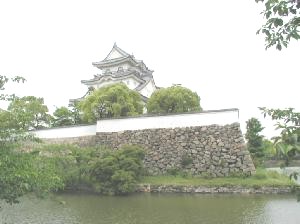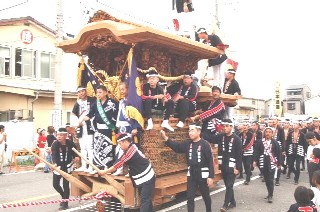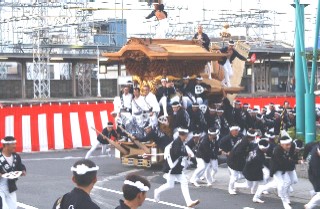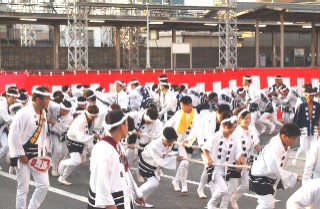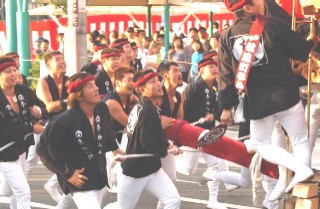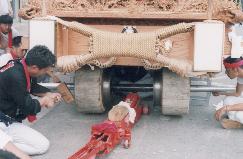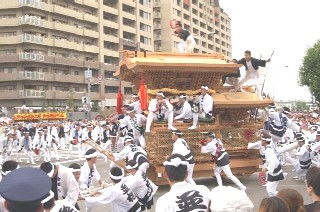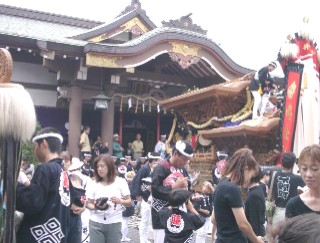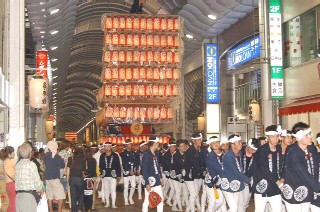 What
is Danjiri Festival ? - It will never fail to impress
visiting spectators What
is Danjiri Festival ? - It will never fail to impress
visiting spectators
Though there is no
accurate record, at least 40 men died in Danjiri festival
since 1898, and so Danjiri
festival is well-known festival as the most dangerous
festival in Japan. On the other hand, Danjiri festival
really and truly attracts and enthuses the participants
who are residents in Kishiwada-city. There would be no
festival such as Danjiri festival even in the world to
say nothing of Japan.In
Kishiwada-city, there is eighty-four Danjiri that is a
kind of float, and very small community that consists of
about 200-1200 families possess Danjiri. Broadly
speaking, each community's area corresponds to township
in New England of U.S.A, and the neighborhoods within the
area organize each very small community. In many case,
community's name means also Japan's address e.g. 679, habutaki-chou,
Kishiwada-city, Osaka, Japan. (Underlined letters are
community's name. That is, there is no street name about
Japan's address in principle. )
Unlike a festival float in USA,
Danjiri isn't equipped with engine, each community's
participants consisting of about 400-800 men have to pull
Danjiri by human power for parade, and it's feature of
Danjiri festival that participants run, pulling Danjiri.
Moreover, Danjiri turns a corner without stopping!. (Since
a thick log is attached to the rear of Danjiri, such
operation is possible. Please refer to "About
Danjiri itself ")
Though it's natural, when Danjri
turns a corner at full speed, it is extremely hard to
control Danjiri's motion. And so, if the operation don't
successfully finish, because of centrifugal force,
Danjiri rolls over, or crashes into building or house. (Most
of accident death on Danjiri featival occur by rollover
or crash at the street corners.)
Though it may be strangely
impressed, participating men are very proud that they
turn a corner at utmost speed without flinching, pulling
Danjri. No, if anything, each community competes to each
other for how fastly Danjiri can turn a corner. Many men
often say that I never regret to die in Danjiri festival.
(Though you might not be believed, it's real !.)
What urges to do such a dangerous
festival?. Probably its answer is "The harder the
achievement is, the more it would be desired, as human
habits." In other words, when they turn a corner at
unbelievable speed, each can feel achievement and
exhilaration, and that would be the greatest motivation
of taking part in Danjiri festival.
Therefore, on the world, No
festival would not more capture and delight participating
men's spirits than Danjiri festival. "Readiness
is all " (from Shakespaer,
please allow trope), this phrase necessarily isn't
overstatement as for Danjiri festival. Assuming that you
really view Danjiri festival, you will be able to
understand!.
 About Danjiri itself About Danjiri itself
 the average size
and weight the average size
and weight
Height : about 3.9m, Width : about 2.5m (top), about 1.7m
(bottom), Length : about 4.3m
Weight : about 4.0 - 4.5 tons
 Raw
material Raw
material
Zelkova. In many case, One danjiri is made by one tree of
Zelkova .
 Costs Costs
:about JP YEN100,000,000 - 120,000,000 (about US$1,000,000),
Donation from community's families covers the costs.
 Features Features
1. As you can guess from the size, Danjiri have very high
center of gravity.
2. Craftsmen handcraft and assemble Danjiri without
nailing.
3. Danjiri is decorated with many hand-carved wooden
sculptures, and the theme is Samurai's battle scene in
old Japan. (Because of that, Danjiri is very expensive
!.)
4.How can Danjiri turn a corner ? Unlike vehicles,
Danjiri's shaft does not roll, that is, only wooden wheel
(raw material : pine) is rolling, and so participants can
change the direction of Danjiri at the street corners by
controlling the one side's wheel rolling, using wooden
bar in front of Danjiri. (At the same time, other
participants operate a big log in rear of Danjiri.)
 History of Danjiri festival History of Danjiri festival
About three hundred years ago, Nagayasu Okabe who is a
feudal lord at those days built Shinto temple
praying for rich harvest, and he permitted town folk to
come into precincts of Castle of Kishiwada, pulling
Danjiri. That is the beginning of Danjiri festival,
according to investigator of local history. And so, it's
the custom of Danjiri festival that participants enter
into Shinto's temple and pray
together with Danjiri.
[About Shinto
i.e. indigenous religion(custom) of Japan.]
Though features of Shinto
are veneration to Japan's Emperor as
descendant of creator in Japanese myth, basing
on Japan's a kind of shamanism, Shinto
has no established system such as originator, religious
community and tenet defined. And so, most of The Japanese
don't clearly recognizes Shinto
as religion. Therefore, Shinto is
custom rather than religion in Japan. (For example, there
are altars of both Shinto and Buddhism in most Japan's
homes.)
 Information Information
 Parade
Schedule of Danjiri Parade
Schedule of Danjiri
Please note that there is no accurate schedule
about 15th on Sep due to traditional events based on Shinto,
as previously stated. The average schedule
in every year is as follows.
1. 14:00 - 16:00, 1st Sunday on Sep, (This parade is for
preparing and training)
2. 14:00 - 16:00, 13th on Sep, (This parade is for
preparing and training.)
3. 6:00 - 7:30, 9:00 - 12:00, 13:00 - 17:00, 19:00 - 22:00
,14th on Sep
4. about 8:30 - about 12:00, 13:00 - about 18:00, 19:00 -
about 23 : 00, 15th on Sep
 Notices Notices
1.Because of a great deal of spectators, you may
be not able to view close to Danjiri at street corners.
2. Since Danjiri festival is dangerous to visiting
spectators, there are many "No Entry Zone"
around street corners. (Please strictly obey to the
directions of men who make order around street corners!.)
 For your
convinience For your
convinience
1. Access to Kishiwada-city ; about 20 minutes
from Kansai airport terminal via Nankai railroad. Please
don't use another railroad because you will waste time.
2.Please don't stay around station of Kishiwada,
because you will not be able to view many Danjiri parade.
You can view many Danjiri's parade at seaside street in
Kishiwa-city, and so, please inquire of mature men who
are wearing festival's uniforms as follows. Maybe
inquired men will manage to indicate the street, with his
gestures.
[sokaimichi wa doko desuka?] in
Japanese.
[Where is sokaimichi?] in English. ("sokaimichi"
is a street name in Kishiwada-city)
|
|
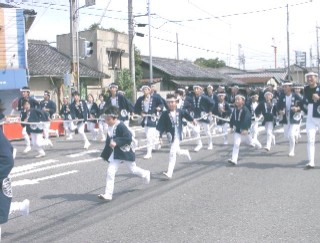 |
